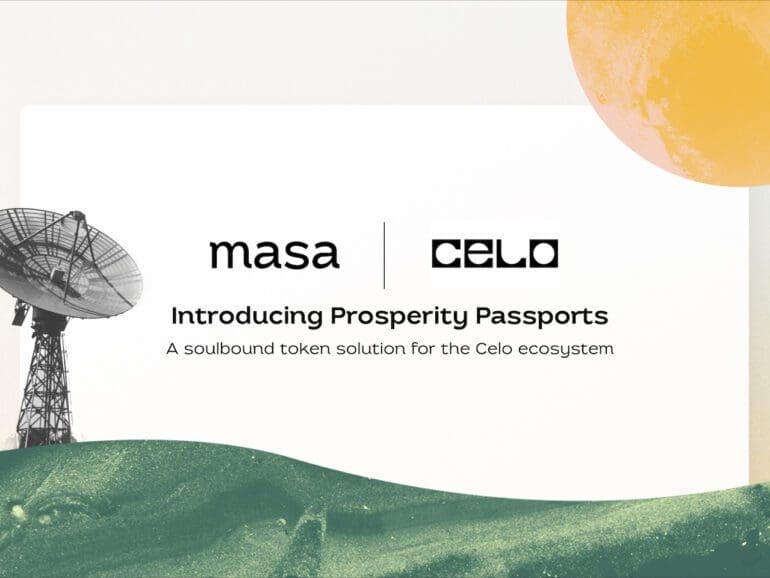Last year, ethereum creator Vitalik Buterin, lawyer Puja Ohlhaver, and economist Eric Glen Weyl introduced the Soulbound token (SBT) idea — fundamentally a non-transferable NFT without monetary value.
The tokens focus on creating a digital identity that remains on the blockchain. Their on-chain nature would make falsification of data and tampering close to impossible. It could be used in several applications, from medical certificates to voting systems.
The theoretical whitepaper was published in May 2022, and the idea seemed to settle quietly into the collective subconscious. However, on March 1, 2023, Masa and Celo foundation announced the launch of SBT-Powered “Prosperity Passports.”
The passports are positioned to offer an easily accessible digital identity for use with on-chain tools and real-world use cases. The company has said users will initially be able to mint soulbound tokens for user verification purposes, credit scores, and community reputation.
RELATED: Soulbound Tokens: A new frontier for decentralization
Accessible identity solutions critical
With growing attempts at creating on-chain utilities for a mass audience, easily accessible digital identity has become critical.
“Most of the identity projects are hard to adopt and do not have a seamless user experience,” said Calanthia Mei, co-founder of Masa Finance.

“There’s simply no standardized identity in Web3 right now, despite many attempts from various decentralized identifiers and verified credential projects out there. One of the main reasons, from my perspective, there’s a lot of friction for users to adopt an identity standard.”
Instruments such as CBDCs are increasingly becoming a focus worldwide but are met with various sticking points that a standardized digital identity solution may address.
“Truly open access to the global financial system, being able to put your on-chain and off-chain data together to prove that you are an authenticated, verified user with X level of creditworthiness and be able to access things like universal basic income, rewards, benefits, coins, etc. That is a huge unlock because, as we know, there’s no universal schema for that kind of thing.”
For many, the mere mention of “Web3” could bring ideas of inaccessibility and complexity, embarked only by the savviest tech understanding. However, Mei explained that the use of SBTs could bring an end to this.
“SBTs are really just a non-transferable NFT. They’ll show up as tokens in your wallet directly,” she said. “That’s why I think SBTs are really changing the landscape here. It’s really important that SBTs are as easy as possible to interact with.”
She explained that within this context, users could just open their mobile wallet, online or offline, and SBTs would be stored directly within it. The SBTs available could range from proof of club membership to tokens that provide access to universal income.
“The user doesn’t even need to know that those are Web3 technology because it’s readily available for them directly in their mobile wallet,” she said.
The use of SBTs within the infrastructure also allows parameters for privacy.
“This is very important because some identity information can be very confidential,” said Mei. “For example, I wouldn’t want to share my verified ID or credit score information directly and publicly on-chain.”
To address this issue, Masa has integrated the ability to request permission for certain SBTs for specific times. Users have complete control of granting permission and taking access away through their passports.
Celo brings low-cost scalability
Mei explained that with the Masa protocol, developers could easily create custom SBTs that could open out the tokens to be applied to several areas.
In the partnership with Celo, Masa will be integrating with wallets to help support users in creating infrastructure for regenerative finance.
“Identity is one of those things that you can use for anything, but it’s about exactly what would suit this community of users,” she continued.
“A few things about Celo really stood out. First of all, mobile-first, second, low cost, and third, very, very scalable. And that is exactly aligned with our vision of bringing the next billion global users…Low gas and highly scalable infrastructure is a must when we do anything on-chain, especially regarding identity.”
“Celo’s community is mostly global. They got into Celo because they want global fair financial access, and many care about sustainability.”
Mei explained that upcoming Celo projects using Masa’s infrastructure with SBTs include creating access to loans in emerging markets, basic universal income, and financial literacy tools. “A lot of them are global-minded and utility-driven,” she said.


